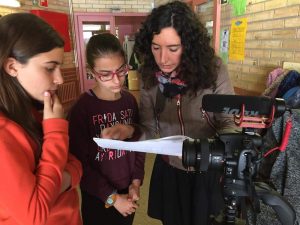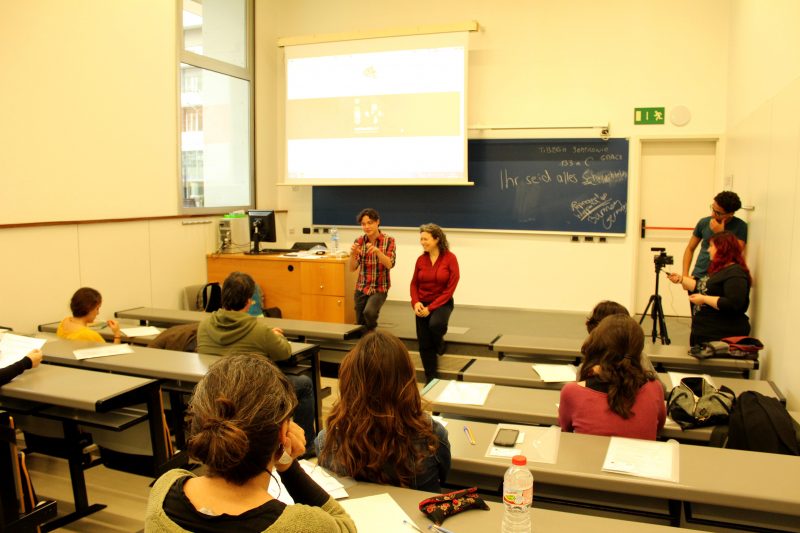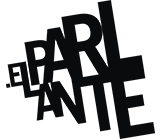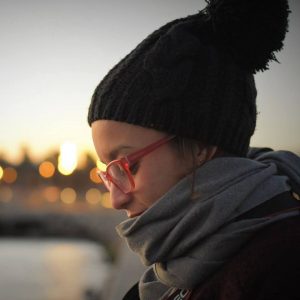Juliana Sotelo presented her project “Danzando la libertad” during the First Glocal Educommunication Seminar. In the debate and the final proposal our Teleduca colleague Matilde Molnar also participated. We interview them both to learn about their experience during the training.
Fear: Ana Cecilia Cervantes / Photo: Francisco Proner/ Farpa (CIDH) Cárcel de Mujeres Támara (Honduras) @CreativeCommons
Matilde Molnar arrived in 2015 to Teleduca. Education and Communication for his training in visual anthropology, and for the purpose of making documentaries with gender perspective. She began making specific collaborations as a trainer, in participatory video workshops, and accompanying various audiovisual projects. But, over time, she was linked in other processes and was assumed new responsibilities that led her to participate in the I Glocal Educommunication Seminar.
Juliana Sotelo Lemus is an attorney who, interested in the Human Rights in Colombia had an approach to Varias Women’s Carceles. I took her to Barcelona to study a Master’s Degree in Crimonology and Criminal Speakership, from where she came to know in depth the reality that women live in their time in prison and after being released. She, like Matilda, enrolled in the Seminary to give her a new perspective on her professional career.
In this interview, they tell us about their experience before and after the Seminar, and they also tell us about Sotelo’s project “Dancing freedom“, whose final proposal also worked participants and teachers, to give the project the educational perspective it needed.
 elParlante- What idea did you have about Educommunication before the Seminar?
elParlante- What idea did you have about Educommunication before the Seminar?
Matilda Molnar- I was excited about doing the Seminar, for reflecting theoretically on the work I had been doing in Teleduca, and for providing concepts and theoretical content to my actions and our way of working. I was also excited about the idea of knowing other experiences of Educomunicación, Learn from them and from other professionals.
Juliana Sotelo- Before starting the Seminar, I did not know with certainty the meaning of Educommunication, but the perception I had of this training is that it would be a space of development in which I would learn, from education and communication, about experiences and processes of social transformation.
Ep- Were expectations met, was the seminar important?
MM- Personally, yes. Doing the seminar helped me to reflect on the theory behind our way of working at Teleduca. The theoretical tools provided by the Seminar allowed me to develop my work with greater confidence and to also be able to address the reflective and theoretical phases of the projects carried out.
.JS- Yes, expectations were met, what I liked most was to have the opportunity to create a project, or develop something that is already in progress. I articulated the final work of the master’s degree that I was studying at that time with the tools I had obtained from the sessions of the Seminar. This project is “Dancing Freedom”.
Ep- Let’s talk about that project: what is it about?, what phase is it in?
.JS- This is research that makes for me master’s thesis and traje in the Seminario for another perspective. It is an initiative to work on the approach to the free body and in movement through dance, from the context of women who have gone through prison, with the purpose of generating empowerment processes once they are outside the prison system.
MM- Among the ideas that emerged during the debate space of the projects, we propose that “Dancing Freedom” also serves to generate networks and links between women who have gone through prison and those who are about to leave. Create a communication channel that allows them to help and support each other, and thus generate a fabric of solidarity. Unfortunately the project could not be carried out yet.
.JS- They are projects that involve many permits, access to the prison system to better understand the reality of women deprived of their liberty and also, the will of many parties who participate in the process. But, the project is listed, so we do not rule out its execution, of course!

I Seminario de Educomunicación Glocal: Sesión teórica realizada en la Universitat Pompeu Fabra (Campus Ciutadella)
Ep- After everything you have learned and lived, do you recommend this experience? Juliana now works with the Speaker in the realization of the Seminar!
.JS- Yes, that’s right. Now I have a double vision, that of student and that of coordinator of the second edition. I would recommend the Seminar, because it is a complete proposal that starts from a theoretical framework, going through experiences in Barcelona and the world, to end with a project of its own to which funding and continuity can be sought . From my experience, the Seminar offered me tools, a basis for undertaking projects and approaching educommunication as a way to generate social change from community learning and empowerment from learning/doing.
MM- I recommend doing the Seminar to all people who work, study or are interested in the community or communication field, because the Seminar addresses a very interesting and essential theoretical content to know when planning community communication projects. A Reflective environment that allows you to rethink your ways of acting in the different contexts of work according to your objectives, the means you have, but mainly depending on The interests and needs of the community, with dialogue and communication being the starting point and a priority element throughout the entire work process.
To know more about this training click on the PDF document Presentación II Seminario Educomunicación Glocal, or visit the website http://educomunicacio-glocal.elparlante.es/

